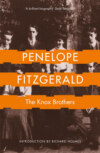Loe raamatut: «The Means of Escape»
Preface by Hermione Lee, Advisory Editor
When Penelope Fitzgerald unexpectedly won the Booker Prize with Offshore, in 1979, at the age of sixty-three, she said to her friends: ‘I knew I was an outsider.’ The people she wrote about in her novels and biographies were outsiders, too: misfits, romantic artists, hopeful failures, misunderstood lovers, orphans and oddities. She was drawn to unsettled characters who lived on the edges. She wrote about the vulnerable and the unprivileged, children, women trying to cope on their own, gentle, muddled, unsuccessful men. Her view of the world was that it divided into ‘exterminators’ and ‘exterminatees’. She would say: ‘I am drawn to people who seem to have been born defeated or even profoundly lost.’ She was a humorous writer with a tragic sense of life.
Outsiders in literature were close to her heart, too. She was fond of underrated, idiosyncratic writers with distinctive voices, like the novelist J. L. Carr, or Harold Monro of the Poetry Bookshop, or the remarkable and tragic poet Charlotte Mew. The publisher Virago’s enterprise of bringing neglected women writers back to life appealed to her, and under their imprint she championed the nineteenth-century novelist Margaret Oliphant. She enjoyed eccentrics like Stevie Smith. She liked writers, and people, who stood at an odd angle to the world. The child of an unusual, literary, middle-class English family, she inherited the Evangelical principles of her bishop grandfathers and the qualities of her Knox father and uncles: integrity, austerity, understatement, brilliance and a laconic, wry sense of humour.
She did not expect success, though she knew her own worth. Her writing career was not a usual one. She began publishing late in her life, around sixty, and in twenty years she published nine novels, three biographies and many essays and reviews. She changed publisher four times when she started publishing, before settling with Collins, and she never had an agent to look after her interests, though her publishers mostly became her friends and advocates. She was a dark horse, whose Booker Prize, with her third novel, was a surprise to everyone. But, by the end of her life, she had been short-listed for it several times, had won a number of other British prizes, was a well-known figure on the literary scene, and became famous, at eighty, with the publication of The Blue Flower and its winning, in the United States, the National Book Critics Circle Award.
Yet she always had a quiet reputation. She was a novelist with a passionate following of careful readers, not a big name. She wrote compact, subtle novels. They are funny, but they are also dark. They are eloquent and clear, but also elusive and indirect. They leave a great deal unsaid. Whether she was drawing on the experiences of her own life – working for the BBC in the Blitz, helping to make a go of a small-town Suffolk bookshop, living on a leaky barge on the Thames in the 1960s, teaching children at a stage-school – or, in her last four great novels, going back in time and sometimes out of England to historical periods which she evoked with astonishing authenticity – she created whole worlds with striking economy. Her books inhabit a small space, but seem, magically, to reach out beyond it.
After her death at eighty-three, in 2000, there might have been a danger of this extraordinary voice fading away into silence and neglect. But she has been kept from oblivion by her executors and her admirers. The posthumous publication of her stories, essays and letters has been followed by a biography (Penelope Fitzgerald: A Life, by Hermione Lee, Chatto & Windus, 2013), and by these very welcome reissues of her work. The fine writers who have done introductions to these new editions show what a distinguished following she has. I hope that many new readers will now discover, and fall in love with, the work of one of the most spellbinding English novelists of the twentieth century.
Praise
From the reviews:
‘The Means of Escape is full of obscure adversity. There is a dogsbody caretaker with a dubious past, a clerical assistant who is given the sack and who returns to haunt his persecutor in a ghost story of extreme, even gleeful, ghoulishness. Fitzgerald’s world is luminous, dark and unflinching but the stories are filled with her characteristic tender, humorous apprehension of human oddness and ordinariness’
HERMIONE LEE, TLS
‘The sense of something colossal at the last being revealed through a tiny turn of phrase, or even a single word, proved one of Fitzgerald’s most remarkable devices. At the end of many of her most marvellous things there is a sense of a great window suddenly opening. That visionary final twist of the screw is unforgettably indulged in these stories. If you miss the significance of the word “a watch” in the last paragraph of “The Red-Haired Girl”, you will not just not understand the depth of love the heroine bears for its painter hero, but miss the point of the whole story … This is a small book, but a remarkably rich one. It sets the seal on a career we, as readers, can only count ourselves lucky to have lived through’
PHILIP HENSHER, Spectator
‘Eerie, spry, and comic. Each piece expands miraculously in the mind’
Harpers & Queen
‘This collection is excellent … a revelation. “Desideratus” – the story of a poor boy, a lost medal, and an ordeal in a great mysterious house – is strange, magical, moving … the sense of things beyond the grasp of intellect’
ALLAN MASSIE, Scotsman
‘This collection contains some of Fitzgerald’s best observations. Each precise word earns its worth, and the prose falls upon the inner ear with deceptive simplicity. A great writer, an ironist in the tradition of Jane Austen, as alive as Henry James to the covert power-play which makes up so much of human intercourse’
SALLEY VICKERS, Financial Times
‘In the world of these stories, fellow human beings bristle with indefinable menace. Their motives and purposes are incomprehensible, even to a comical degree. Life itself, these stories seem to say, is a delicate equipoise, kept aloft by all manner of imperceptible motions, and the journey from A to B is a graceful navigation through horrors. This is a wonderful collection – terrifying, beautiful and funny’
The Tablet
‘A farewell of undiminishing grace … spare, witty and understated’
Boston Globe
‘“There is nothing really lasting, nothing that will endure, except the sincere expression of the actual conditions of life,” a character quotes. “Conditions in the potato patch, in the hayfield, at the washtub, in the open street!” This is what Fitzgerald captures in her writing, and why she will endure’
Los Angeles Times ‘Best Books of 2000’
‘I’m profoundly envious of people who haven’t read Fitzgerald. There are such treasures in store for them … The stories collected in The Means of Escape are a distillation of her formidable talent. They display that blend of truthful observation and deadpan comedy that stamped everything she wrote’
The Age (Australia)
By the same author
FICTION
The Golden Child
The Bookshop
Offshore
Human Voices
At Freddie’s
Innocence
The Beginning of Spring
The Gate of Angels
The Blue Flower
The Means of Escape
NON-FICTION
Edward Burne-Jones
The Knox Brothers
Charlotte Mew and her Friends
A House of Air: Selected Writings
So I Have Thought of You: The Letters of Penelope Fitzgerald
The Means of Escape
STORIES
PENELOPE FITZGERALD

Copyright
4th Estate
An imprint of HarperCollinsPublishers 1 London Bridge Street London SE1 9GF
This eBook first published in Great Britain by 4th Estate in 2016
First published in Great Britain by Flamingo 2000
Copyright © the Estate of Penelope Fitzgerald 2000, 2016
‘The Means of Escape’ © Penelope Fitzgerald 1993: first published in the anthology Infidelity, Chatto & Windus, 1993 and New Writing 4, Vintage, 1995; ‘The Axe’ © Jonathan Cape Ltd 1975; first published in The Times Anthology of Ghost Stories, Jonathan Cape, 1975; ‘The Red-Haired Girl’ © Penelope Fitzgerald 1998: first published in The Times Literary Supplement, 1998; ‘Beehernz’ © Penelope Fitzgerald 1997: first published in BBC Music Magazine, October 1997 and Fanfare, BBC Books, 1999; ‘The Prescription’ © Penelope Fitzgerald 1982: first published in the London Review of Books December 1982 and New Stories 8, Hutchinson/Arts Council 1983; ‘At Hiruharama’ © Penelope Fitzgerald 1992: first published in New Writing, Minerva/Arts Council 1992; ‘Not Shown’ © Penelope Fitzgerald 1993: first published in the Daily Telegraph, 1993; ‘The Likeness’ © Penelope Fitzgerald 1989: first published in Prize Writing, Hodder and Stoughton, 1989; ‘Our Lives Are Only Lent To Us’ © the Estate of Penelope Fitzgerald 2001, previously unpublished; ‘Desideratus’ © Penelope Fitzgerald 1997: first published in New Writing 6, Vintage/The British Council 1997; ‘Worlds Apart’ © the Estate of Penelope Fitzgerald 1983: first published in Woman magazine, 1989.
Preface © Hermione Lee 2013
Series advisory editor: Hermione Lee
The Author asserts the moral right to be identified as the author of this collection
A catalogue record for this book is available from the British Library
Cover photograph © Mary Evans
Cover design by nathanburtondesign.com
These stories are works of fiction. The names, characters and incidents portrayed in them are the work of the author’s imagination. Any resemblance to actual persons, living or dead, events or localities, is entirely coincidental
All rights reserved under International and Pan-American Copyright Conventions. By payment of the required fees, you have been granted the non-exclusive, non-transferable right to access and read the text of this e-book on-screen. No part of this text may be reproduced, transmitted, down-loaded, decompiled, reverse engineered, or stored in or introduced into any information storage and retrieval system, in any form or by any means, whether electronic or mechanical, now known or hereinafter invented, without the express written permission of HarperCollins
Source ISBN: 9780007105014
Ebook Edition © December 2016 ISBN: 9780007521418
Version: 2016-11-18
Contents
Cover
Preface by Hermione Lee
Praise
By the Same Author
Title Page
Copyright
The Means of Escape
The Axe
The Red-Haired Girl
Beehernz
The Prescription
At Hiruharama
Not Shown
The Likeness
Our Lives Are Only Lent To Us
Desideratus
Worlds Apart
About the Author
About the Publisher
The Means of Escape
St George’s Church, Hobart, stands high above Battery Point and the harbour. Inside, it looks strange and must always have done so, although (at the time I’m speaking of) it didn’t have the blue, pink and yellow-patterned stained glass that you see there now. That was ordered from a German firm in 1875. But St George’s has always had the sarcophagus-shaped windows which the architect had thought Egyptian and therefore appropriate (St George is said to have been an Egyptian saint). They give you the curious impression, as you cross the threshold, of entering a tomb.
In 1852, before the organ was installed, the church used to face east, and music was provided by a seraphine. The seraphine was built, and indeed invented, by a Mr Ellard, formerly of Dublin, now a resident of Hobart. He intended it to suggest the angelic choir, although the singing voices at his disposal – the surveyor general, the naval chaplain, the harbourmaster and their staffs – were for the most part male. Who was able to play the seraphine? Only, at first, Mr Ellard’s daughter, Mrs Logan, who seems to have got £20 a year for doing so, the same fee as the clerk and the sexton. When Mrs Logan began to feel the task was too much for her – the seraphine needs continuous pumping – she instructed Alice Godley, the Rector’s daughter.
Hobart stands ‘south of no north’, between snowy Mount Wellington and the River Derwent, running down over steps and promontories to the harbour’s bitterly cold water. You get all the winds that blow. The next stop to the south is the limit of the Antarctic drift ice. When Alice came up to practise the hymns she had to unlock the outer storm door, made of Huon pine, and the inner door, also a storm door, and drag them shut again.
The seraphine stood on its own square of Axminster carpet in the transept. Outside (at the time I’m speaking of) it was a bright afternoon, but inside St George’s there was that mixture of light and inky darkness which suggests that from the darkness something may be about to move. It was difficult, for instance, to distinguish whether among the black-painted pews, at some distance away, there was or wasn’t some person or object rising above the level of the seats. Alice liked to read mystery stories, when she could get hold of them, and the thought struck her now, ‘The form of a man is advancing from the shadows.’
If it had been ten years ago, when she was still a school-girl, she might have shrieked out, because at that time there were said to be bolters and escaped convicts from Port Arthur on the loose everywhere. The Constabulary hadn’t been put on to them. Now there were only a few names of runaways, perhaps twenty, posted up on the notice boards outside Government House.
‘I did not know that anyone was in the church,’ she said. ‘It is kept locked. I am the organist. Perhaps I can assist you?’
A rancid stench, not likely from someone who wanted to be shown round the church, came towards her up the aisle. The shape, too, seemed wrong. But that, she saw, was because the head was hidden in some kind of sack like a butchered animal, or, since it had eyeholes, more like a man about to be hung.
‘Yes,’ he said, ‘you can be of assistance to me.’
‘I think now that I can’t be,’ she said, picking up her music case. ‘No nearer,’ she added distinctly.
He stood still, but said, ‘We shall have to get to know one another better.’ And then, ‘I am an educated man. You may try me out if you like, in Latin and some Greek. I have come from Port Arthur. I was a poisoner.’
‘I should not have thought you were old enough to be married.’
‘I never said I poisoned my wife!’ he cried.
‘Were you innocent, then?’
‘You women think that everyone in gaol is innocent. No, I’m not innocent, but I was wrongly incriminated. I never lifted a hand. They criminated me on false witness.’
‘I don’t know about lifting a hand,’ she said. ‘You mentioned that you were a poisoner.’
‘My aim in saying that was to frighten you,’ he said. ‘But that is no longer my aim at the moment.’
It had been her intention to walk straight out of the church, managing the doors as quickly as she could, and on no account looking back at him, since she believed that with a man of bad character, as with a horse, the best thing was to show no emotion whatever. He, however, moved round through the pews in such a manner as to block her way.
He told her that the name he went by, which was not his given name, was Savage. He had escaped from the Model Penitentiary. He had a knife with him, and had thought at first to cut her throat, but had seen almost at once that the young lady was not on the cross. He had got into the church tower (which was half finished, but no assigned labour could be found to work on it at the moment) through the gaps left in the brickwork. Before he could ask for food she told him firmly that she herself could get him none. Her father was the incumbent, and the most generous of men, but at the Rectory they had to keep very careful count of everything, because charity was given out at the door every Tuesday and Thursday evening. She might be able to bring him the spent tea-leaves, which were always kept, and he could mash them again if he could find warm water.
‘That’s a sweet touch!’ he said. ‘Spent tea-leaves!’
‘It is all I can do now, but I have a friend – I may perhaps be able to do more later. However, you can’t stay here beyond tomorrow.’
‘I don’t know what day it is now.’
‘It is Wednesday, the twelfth of November.’
‘Then Constancy is still in harbour.’
‘How do you know that?’
It was all they did know, for certain, in the penitentiary. There was a rule of absolute silence, but the sailing lists were passed secretly between those who could read, and memorized from them by those who could not.
‘Constancy is a converted collier, carrying cargo and a hundred and fifty passengers, laying at Franklin Wharf. I am entrusting you with my secret intention, which is to stow on her to Portsmouth, or as far at least as Cape Town.’
He was wearing grey felon’s slops. At this point he took off his hood, and stood wringing it round and round in his hands, as though he was trying to wash it.
Alice looked at him directly for the first time.
‘I shall need a change of clothing, ma’am.’
‘You may call me “Miss Alice”,’ she said.
At the prompting of some sound, or imaginary sound, he retreated and vanished up the dark gap, partly boarded up, of the staircase to the tower. That which had been on his head was left in a heap on the pew. Alice took it up and put it into her music case, pulling the strap tight.
She was lucky in having a friend very much to her own mind, Aggie, the daughter of the people who ran Shuckburgh’s Hotel; Aggie Shuckburgh, in fact.
‘He might have cut your throat, did you think of that?’
‘He thought better of it,’ said Alice.
‘What I should like to know is this: why didn’t you go straight to your father, or to Colonel Johnson at the Constabulary? I don’t wish you to answer me at once, because it mightn’t be the truth. But tell me this: would you have acted in the same manner, if it had been a woman hiding in the church?’ Alice was silent, and Aggie said, ‘Did a sudden strong warmth spring up between the two of you?’
‘I think that it did.’
No help for it, then, Aggie thought. ‘He’ll be hard put to it, I’m afraid. There’s no water in the tower, unless the last lot of builders left a pailful, and there’s certainly no dunny.’ But Alice thought he might slip out by night. ‘That is what I should do myself, in his place.’ She explained that Savage was an intelligent man, and that he intended to stow away on Constancy.
‘My dear, you’re not thinking of following him?’
‘I’m not thinking at all,’ said Alice.
They were in the hotel, checking the clean linen. So many tablecloths, so many aprons, kitchen, so many aprons, dining-room, so many pillow shams. They hardly ever talked without working. They knew their duties to both their families.
Shuckburgh’s had its own warehouse and bond store on the harbour front. Aggie would find an opportunity to draw out, not any of the imported goods, but at least a ration of tea and bacon. Then they could see about getting it up to the church.
‘As long as you didn’t imagine it, Alice!’
Alice took her arm. ‘Forty-five!’
They had settled on the age of forty-five to go irredeemably cranky. They might start imagining anything they liked then. The whole parish, indeed the whole neighbourhood, thought that they were cranky already, in any case, not to get settled, Aggie in particular, with all the opportunities that came her way in the hotel trade.
‘He left this behind,’ said Alice, opening her music case, which let fly a feral odour. She pulled out the sacking mask, with its slits, like a mourning pierrot’s, for eyes.
‘Do they make them wear those?’
‘I’ve heard Father speak about them often. They wear them every time they go out of their cells. They’re part of the new system, they have to prove their worth. With the masks on, none of the other prisoners can tell who a man is, and he can’t tell who they are. He mustn’t speak either, and that drives a man into himself, so that he’s alone with the Lord, and can’t help but think over his wrongdoing and repent. I never saw one of them before today, though.’
‘It’s got a number on it,’ said Aggie, not going so far as to touch it. ‘I dare say they put them to do their own laundry.’
At the Rectory there were five people sitting down already to the four o’clock dinner. Next to her father was a guest, the visiting preacher; next to him was Mrs Watson, the housekeeper. She had come to Van Diemen’s Land with a seven-year sentence, and now had her ticket to leave. Assigned servants usually ate in the backhouse, but in the Rector’s household all were part of the same family. Then, the Lukes. They were penniless immigrants (his papers had Mr Luke down as a scene-painter, but there was no theatre in Hobart). He had been staying, with his wife, for a considerable time.
Alice asked them all to excuse her for a moment while she went up to her room. Once there, she lit a piece of candle and burned the lice off the seams of the mask. She put it over her head. It did not disarrange her hair, the neat smooth hair of a minister’s daughter, always presentable on any occasion. But the eyeholes came too low down, so that she could see nothing and stood there in stifling darkness. She asked herself, ‘Wherein have I sinned?’
Her father, who never raised his voice, called from downstairs, ‘My dear, we are waiting.’ She took off the mask, folded it, and put it in the hamper where she kept her woollen stockings.
After grace they ate red snapper, boiled mutton and bread pudding, no vegetables. In England the Reverend Alfred Godley had kept a good kitchen garden, but so far he had not been able to get either leeks or cabbages going in the thin earth round Battery Point.
Mr Luke hoped that Miss Alice had found her time at the instrument well spent.
‘I could not get much done,’ she answered. ‘I was interrupted.’
‘Ah, it’s a sad thing for a performer to be interrupted. The concentration of the mind is gone. “When the lamp is shattered …”’
‘That is not what I felt at all,’ said Alice.
‘You are too modest to admit it.’
‘I have been thinking, Father,’ said Alice, ‘that since Mr Luke cares so much for music, it would be a good thing for him to try the seraphine himself. Then if by any chance I had to go away, you would be sure of a replacement.’
‘You speak as if my wife and I should be here always,’ cried Mr Luke.
Nobody made any comment on this – certainly not Mrs Luke, who passed her days in a kind of incredulous stupor. How could it be that she was sitting here eating bread pudding some twelve thousand miles from Clerkenwell, where she had spent all the rest of her life? The Rector’s attention had been drawn away by the visiting preacher, who had taken out a copy of the Hobart Town Daily Courier, and was reading aloud a paragraph which announced his arrival from Melbourne. ‘Bringing your welcome with you,’ the Rector exclaimed. ‘I am glad the Courier noted it.’ – ‘Oh, they would not have done,’ said the preacher, ‘but I make it my practice to call in at the principal newspaper offices wherever I go, and make myself known with a few friendly words. In that way, if the editor has nothing of great moment to fill up his sheet, which is frequently the case, it is more than likely that he will include something about my witness.’ He had come on a not very successful mission to pray that gold would never be discovered in Van Diemen’s Land, as it had been on the mainland, bringing with it the occasion of new temptations.
After the dishes were cleared Alice said she was going back for a while to Aggie’s, but would, of course, be home before dark. Mr Luke, while his wife sat on with half-closed eyes, came out to the back kitchen and asked Mrs Watson, who was at the sink, whether he could make himself useful by pumping up some more water.
‘No,’ said Mrs Watson.
Mr Luke persevered. ‘I believe you to have had considerable experience of life. Now, I find Miss Alice charming, but somewhat difficult to understand. Will you tell me something about her?’
‘No.’
Mrs Watson was, at the best of times, a very silent woman, whose life had been an unfortunate one. She had lost three children before being transported, and could not now remember what they had been called. Alice, however, did not altogether believe this, as she had met other women who thought it unlucky to name their dead children. Mrs Watson had certainly been out of luck with her third, a baby, who had been left in the charge of a little girl of ten, a neighbour’s daughter, who acted as nursemaid for fourpence a week. How the house came to catch fire was not known. It was a flash fire. Mrs Watson was out at work. The man she lived with was in the house, but he was very drunk, and doing – she supposed – the best he could under the circumstances, he pitched both the neighbour’s girl and the baby out of the window. The coroner had said that it might just as well have been a Punch and Judy show. ‘Try to think no more about it,’ Alice advised her. As chance would have it, Mrs Watson had been taken up only a week later for thieving. She had tried to throw herself in the river, but the traps had pulled her out again.
On arrival in Hobart she had been sent to the Female Factory, and later, after a year’s steady conduct, to the Hiring Depot where employers could select a pass-holder. That was how, several years ago, she had fetched up at the Rectory. Alice had taught her to write and read, and had given her (as employers were required to do in any case) a copy of the Bible. She handed over the book with a kiss. On the flyleaf she had copied out a verse from Hosea – ‘Say to your sister, Ruhaman, you have obtained mercy.’
Mrs Watson had no documents which indicated her age, and her pale face was not so much seamed or lined as knocked, apparently, out of the true by a random blow which might have been time or chance. Perhaps she had always looked like that. Although she said nothing by way of thanks at the time, it was evident, as the months went by, that she had transferred the weight of unexpended affection which is one of a woman’s greatest inconveniences on to Miss Alice. This was clear partly from the way she occasionally caught hold of Alice’s hand and held it for a while, and from her imitation, sometimes unconsciously grotesque, of Alice’s rapid walk and her way of doing things about the house.
Aggie had the tea, the bacon, the plum jam, and, on her own initiative, had added a roll of tobacco. This was the only item from the bond store and perhaps should have been left alone, but neither of the girls had ever met or heard of a man who didn’t smoke or chew tobacco if he had the opportunity. They knew that on Norfolk Island and at Port Arthur the convicts sometimes killed for tobacco.
They had a note of the exact cash value of what was taken. Alice would repay the amount to Shuckburgh’s Hotel from the money she earned from giving music lessons. (She had always refused to take a fee for playing the seraphine at St George’s.) But what of truth’s claim, what of honesty’s? Well, Alice would leave, say, a hundred and twenty days for Constancy to reach Portsmouth. Then she would go to her father.
‘What will you say to him?’ Aggie asked.
‘I shall tell him that I have stolen and lied, and caused my friend to steal and lie.’
‘Yes, but that was all in the name of the corporeal mercies. You felt pity for this man, who had been a prisoner, and was alone in the wide world.’
‘I am not sure that what I feel is pity.’
Certainly the two of them must have been seen through the shining front windows of the new terraced houses on their way up to the church. Certainly they were seen with their handcart, but this was associated with parish magazines and requests for a subscription to something or other, so that at the sight of it the watchers left their windows. At the top of the rise Aggie, who was longing to have a look at Alice’s lag, said, ‘I’ll not come in with you.’
‘But, Aggie, you’ve done so much, and you’ll want to see his face.’
‘I do want to see his face, but I’m keeping myself in check. That’s what forms the character, keeping yourself in check at times.’
‘Your character is formed already, Aggie.’
‘Sakes, Alice, do you want me to come in with you?’
‘No.’
‘Mr Savage,’ she called out decisively.
‘I am just behind you.’
Without turning round, she counted out the packages in their stout wrapping of whitish paper. He did not take them, not even the tobacco, but said, ‘I have been watching you and the other young lady from the tower.’
‘This situation can’t continue,’ said Alice. ‘There is the regular Moonah Men’s prayer meeting on Friday.’
‘I shall make a run for it tomorrow night,’ said Savage, ‘but I need women’s clothing. I am not of heavy build. The flesh came off me at Port Arthur, one way and another. Can you furnish me?’
‘I must not bring women’s clothes to the church,’ said Alice. ‘St Paul forbids it.’ But she had often felt that she was losing patience with St Paul.
Tasuta katkend on lõppenud.




















